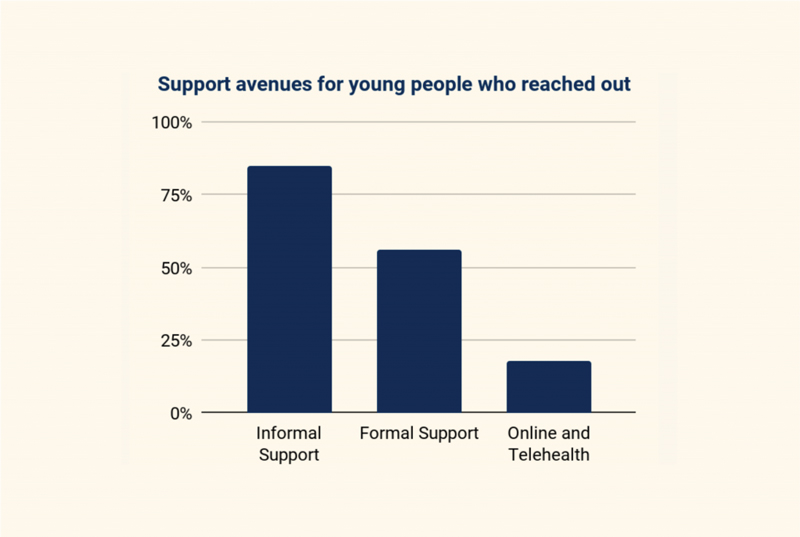Preliminary findings from drought-relief research with young people funded by NSW Department of Education.
It is not breaking news that the last few years have been tough for everyone. Between a pandemic, political unrest, and natural disasters, there has been a lot to deal with and it’s fair to say the mental health of many has taken a hit.
At batyr, we recognise that these events have been hard on young people, particularly for those living in regional and remote areas who had been affected by the drought. However, we wanted to really understand how they are feeling, what is supporting their mental health, and how we can help.
So, what did we do?
We enlisted the help of researchers from the University of Sydney to collect baseline data (i.e. before batyr@school programs had been delivered) from young people living in drought-affected areas of NSW. We asked them about their experiences with mental ill-health, and how likely they would be to reach out for help if they needed it.
Who did we talk to?
We spoke with 457 students across the 18 regional and remote schools that batyr has worked with. 54% were female, 42% male, and 4% indicated ‘other’. 37% of students identified as Aboriginal or Torres Strait Islander. 61% of the students had a family member or close friend experience a mental health issue.
What did they say?
The findings around help-seeking were of concern; students are not reaching out for support. In fact, only 30% of the students reported that they had sought help for a personal, emotional, or mental health issue. This is a very low percentage considering this includes students reaching out to a friend or family member, not just professional support.
Further, 33% of the students said they would NOT seek help if they experienced mental ill-health. This is a frightening statistic as we know that dealing with mental ill-health can be challenging and incredibly isolating. Seeking help can create a supportive network for the individual, who can offer helpful and appropriate guidance. We also found that males were less likely to seek help than females (20% vs. 38%).
Of the students who reached out for support, 85% accessed it from informal sources, such as family or friends, with only 56% seeking professional support, such as school counsellors and GPs. 18% reached out for help online or from phone helplines. While informal support can be great sources of care and guidance, it is important for young people to not only recognise when professional support may help, but that they have access to immediate, quality services when needed.

So, why are young people from these drought-affected regions not seeking mental health help and support?
Well, there are certain barriers that often get in the way. The students shared that geographical isolation, family dysfunction, work pressures, unemployment, and low socioeconomic status impacted both their mental health, as well as their help-seeking behaviours.
Mental health services and supports are often lacking in these regions, and even if they are available, they are often hard to access. This can be due to several factors, including limited awareness that they exist, long-waiting lists, high-costs, and reluctance to seek help due to stigma.
“… it is a very small community. And if one person sees that person getting the mental health check, they will generally think that means craziness, everyone’s very interconnected, it’s not easy.”- Student
What can we do?
These findings show that there is work to be done in not only increasing help-seeking behaviours of young people in these communities, but in addressing the individual barriers to professional support young people are experiencing.
“This research project is incredibly important for batyr as we know that the best way we can truly learn how to address the recent impacts being felt from the last couple of years is to go directly to the source – young people. The fact that 85% of young people don’t reach out to professional services tells us that we need to not only continue to invest in clinical services but also go upstream and support young people and communities earlier. We hope this report can help us all evolve our practices in ways that address what we’re hearing to make the greatest differences we can.” – Nic Brown, batyr CEO
Recommendations from this report include:
- more mental health programs that target supporting young people, teachers and parents
- more personnel and resources in schools to support student wellbeing.

At batyr, we aim to connect, educate, and empower young people to build safe, resilient, and mentally healthy communities. We will continue to do so by working with these communities and delivering critical, peer-to-peer programs in education and community settings. We will also continue to train young people and the broader community on how to have safe conversations about mental health, and to identify signs of distress early. It is important that communities are equipped to better support each other and have the knowledge and skills to manage mental health issues, before they get to a point of crisis.
What’s next?
The impact of the batyr@school program in these communities will be presented in a report and released later this year. We look forward to sharing practical recommendations for how we can all work together to create the most positive mental health outcomes for young people possible.
Times are tough, but so are young people – especially when we all support each other.
batyr would like to thank the research team at USYD, Dr Alyssa Milton, Margaret Yeung, Katrina Conn, and Professor Nick Glozier for their work on this project.
To hear more about the project, feel free to reach out to batyr’s Research and Policy Manager Tom Riley tom@batyr.com.au.